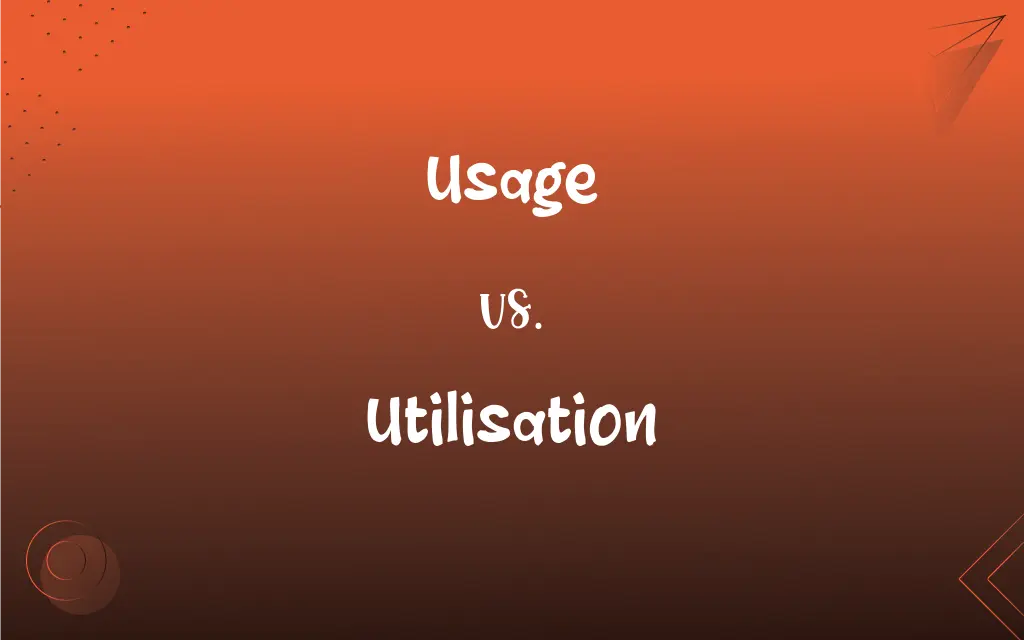Usage vs. Utilisation: What's the Difference?
Edited by Aimie Carlson || By Harlon Moss || Published on December 25, 2023
Usage refers to how something is used in practice. Utilisation refers to the act of making effective use of something.

Key Differences
Usage generally refers to the manner in which words, phrases, or items are employed in different contexts. It encompasses the conventions and practices in language or technology. Utilisation, on the other hand, specifically implies the process of making use of something effectively or efficiently. While usage can be casual or habitual, utilisation often suggests a purposeful and optimal application.
In the realm of language, usage denotes how words are commonly used in speech and writing, reflecting linguistic habits. It's more about the prevalence of certain forms or structures. Utilisation in language could refer to strategically employing specific words or styles to achieve a desired effect, such as persuasion or clarity.
In technology, usage describes how a device or software is operated or the extent to which it is used. For instance, internet usage reflects how frequently and in what ways individuals access the web. Utilisation in this context would refer to how efficiently these tools are employed, maximizing their potential benefits while minimizing waste or inefficiency.
Usage also encompasses the aspect of customs or practices in various fields, such as cultural or social norms. It's broader and can be more subjective. Utilisation is more objective and results-oriented, focusing on how resources or abilities are deployed to achieve specific goals.
Usage and utilisation can sometimes be used interchangeably, they have distinct connotations. Usage is more about common patterns or practices, while utilisation emphasizes effective or efficient employment of resources or abilities.
ADVERTISEMENT
Comparison Chart
Focus
Emphasizes the manner or frequency of use
Emphasizes the efficiency or effectiveness of use
Context
Broader, can be habitual or customary
More specific, aimed at achieving a goal
Connotation
Often neutral or descriptive
Generally implies a strategic or optimal approach
Application
Common in language, technology, and social practices
Common in resource management and strategic planning
Implication
Descriptive of current patterns
Suggestive of potential improvements or optimizations
ADVERTISEMENT
Usage and Utilisation Definitions
Usage
The amount of something used.
The usage of electricity spikes during hot summer months.
Utilisation
The action of making practical and effective use of something.
The utilisation of solar energy reduces reliance on fossil fuels.
Usage
The operation or employment of something.
His usage of the new software improved efficiency.
Utilisation
The extent to which something is used to its full potential.
The utilisation of space in small apartments requires creativity.
Usage
The customary practice in speech or writing.
The usage of formal language is expected in academic papers.
Utilisation
Employment of something for a useful purpose.
The utilisation of waste materials in art is environmentally friendly.
Usage
The way in which a word or phrase is normally and correctly used.
The usage of “ironic” in modern conversation often deviates from its literary definition.
Utilisation
Efficient use of resources or materials.
Good utilisation of time is crucial for success in exams.
Usage
The habitual use of something.
Daily usage of the internet is common in modern society.
Utilisation
The state of being used effectively.
The utilisation of her skills in the project was commendable.
Usage
The act, manner, or amount of using; use
Patterns of computer usage.
An instrument that measures water usage.
Utilisation
The act of using something.
Utilisation
The manner in which something is used.
Utilisation
The state of being used.
Utilisation
The act of using;
He warned against the use of narcotic drugs
Skilled in the utilization of computers
FAQs
Does usage always imply correct application?
Not necessarily. Usage can also reflect common but incorrect practices.
What does usage mean in linguistics?
It refers to the way in which words and phrases are typically used in a language.
Can usage and utilisation be used interchangeably?
While they are sometimes used interchangeably, they have distinct nuances, with utilisation often implying efficient or purposeful use.
What is an example of utilisation in business?
Maximizing the productivity of employees is an example of resource utilisation in business.
How does utilisation relate to sustainability?
Utilisation in sustainability focuses on using resources in an efficient, responsible way to reduce waste and environmental impact.
Can usage change over time?
Yes, usage, especially in language, evolves over time due to cultural and societal changes.
How is utilisation measured?
Utilisation is often measured in terms of efficiency, effectiveness, and the extent to which potential is realized.
How does usage differ in different cultures?
Usage can vary significantly across cultures, reflecting unique social norms, language patterns, and practices.
Is utilisation always a conscious process?
Generally, yes. Utilisation usually involves a deliberate effort to use something effectively.
What role does technology play in utilisation?
Technology often enhances utilisation by improving efficiency and enabling new methods of using resources.
Are there ethical considerations in usage?
Yes, ethical considerations in usage can arise, especially in terms of language, technology, and cultural practices.
How do changes in society affect usage?
Societal changes can lead to shifts in usage norms, reflecting evolving attitudes, technologies, and cultural dynamics.
Does usage reflect individual or collective practices?
Usage can reflect both individual habits and collective practices.
Can utilisation be applied to intangible resources?
Yes, utilisation can apply to intangible resources like time, skills, and information.
How does utilisation relate to efficiency?
Utilisation is closely tied to efficiency, as it involves using resources in a way that maximizes output and minimizes waste.
What factors influence utilisation strategies?
Factors include resource availability, goals, technological advancements, and environmental considerations.
Can usage norms be incorrect or harmful?
Yes, some usage norms can perpetuate inaccuracies or harmful practices and may need to be challenged.
How does technology affect language usage?
Technology influences language usage by introducing new terms and changing communication patterns.
Is utilisation always beneficial?
While utilisation aims to be beneficial, it can have negative consequences if not managed responsibly.
Can usage be standardized?
Usage can be standardized in certain contexts, like formal writing, but often varies in informal settings.
About Author
Written by
Harlon MossHarlon is a seasoned quality moderator and accomplished content writer for Difference Wiki. An alumnus of the prestigious University of California, he earned his degree in Computer Science. Leveraging his academic background, Harlon brings a meticulous and informed perspective to his work, ensuring content accuracy and excellence.
Edited by
Aimie CarlsonAimie Carlson, holding a master's degree in English literature, is a fervent English language enthusiast. She lends her writing talents to Difference Wiki, a prominent website that specializes in comparisons, offering readers insightful analyses that both captivate and inform.






































































